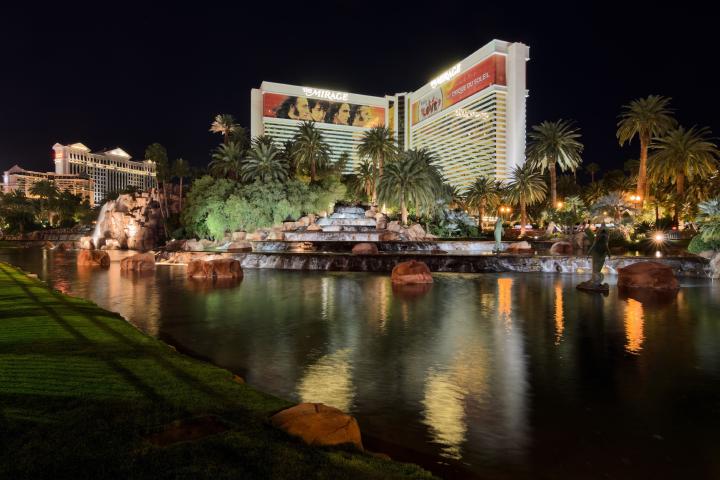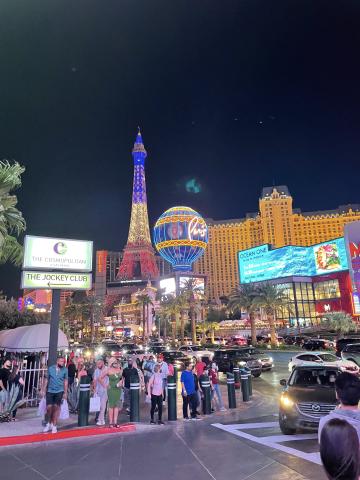This is a collage of several journals (composed at various levels of drunkenness) over the past weekend in Vegas, and my post-trip reflections from immersing myself in that environment.
Liminality is defined as the quality of transition between one destination and the next. It’s a state of being that feels unnatural because it’s meant to be temporary. Liminal states and places are defined only by their beginning and end—they have no meaning in absence of their composite destinations.

a fallen soldier stuck in a physical liminal space (hotel hallway) in the liminal city.
Vegas is the perfect example of a liminal city. It’s 6:30am and I’m attempting to write my nightly journal, watching the sun rise over the Strip. The first thing I was reminded of walking into the hotel lobby and casino is the Lotus Hotel and Casino from the Percy Jackson books, where residents are tricked into staying at the hotel forever by its comfort and elimination of time (those inside never age). After a couple days here, I finally comprehend the inspiration for that piece of the world. Casinos try to create the human analog to an island of sirens, a place where you’re stuck in, unable to reach your end destination. Vegas brings together people from very different circumstances in a bastion to distraction and decadence who are all in search of something. In that sense, they’re on a journey from their current state on life towards some other state of being. It’s sort of like the yearning people go to New York with. Except instead of that romantic, cinematic longing for summer sunsets and hot chocolate in a gentle snow and the bustle of a city that’s alive that embodies New York, Vegas feels like the uglier, realer, more flimsy flavor of that same desire. People chase their dreams in New York, while people come to shortcut an artificial fantasy of their dreams in Vegas. Vegas is the manufactured liminal space between our current reality and the “dream life” that society tells us to crave.

view of the sunrise after a full night through the sheen of the window cover.
Vegas is a city of illusions. You trade in cash for fake money, and performers create fantasies on demand, whether a circus or a cowboy club. To participate in the festivities, you’re pressured to fill a role that you aren’t, that of an unfazed gambler, a tireless partier, a suave wine connoisseur. The appearance of things matters far more than their substance: a strict dress code applies to any club, everything is built bigger and brighter, and your group’s gender ratio determines how easy of a time you’ll have going out. People come to Vegas to get out of the expectations that hold them down in their normal lives by willfully subjecting themselves to the illusion. Vegas sells the promise of feeling like you’re living in decadence in exchange for playing in a system that is designed to maximize the amount squeezed outof visitors. Gambling games are set up with variable rewards to encourage addiction and mathematically defined to always favor the house. Clubs are designed to prey on exclusivity and hype and play up gender stereotypes and traditional notions of attractiveness to manufacture artificial demand for “getting in.” Buffets are crafted to be inviting and endless, with patterns to encourage the consumption of lower-cost, filling foods, in order to keep people (and their money) in the place where the gambling happens longer.

The blue sky ceiling, Renaissance architecture, and river (with real rowers!) at The Venetian hotel and casino.
The easy but wrong conclusion to draw is that people who come to Vegas are dumb. The nuance is that many people are aware of all these things and still want to and choose to come to Vegas and have fun here. I think why we’re so unexplainably drawn to Vegas beyond the surface-level appeal of these things is that it’s a caricature of real society, one that is transparent about how fake it is. Even though everything is built on illusions and performances, the city is shameless in embracing its infamous reputation. It doesn’t caveat or try to hedge its identity with things that are more “appropriate” and instead, leverages the “City of Sin” brand as part of its appeal. This unabashed embrace of impropriety has the same sort of draw as the call of the void or when we can’t look away from something that feels wrong. It’s the same phenomenon for why Trump generated so much attention; there’s something about things that drastically defy normalized societal behaviors that is irresistible in an unsettling way. Vegas embraces the fact that it’s a city of illusions and pretending, and we’re drawn to it because it’s the sort of thing you’re not supposed to say back in real life.1 It’s the same sort of feeling you get when you’re “in” on an inside joke, except the joke here is the fact that our lives in society derive some absolute meaning from our artificial structures around denoting status and happiness. Caricatures are made to exaggerate differences, and Vegas exaggerates the illusions that we believe in in order to operate in modern-day society. To gamble, you exchange a made-up currency for an even faker currency. To go out, you trade the rules of what is deemed appropriate for how you can behave for strict rules on how you can look, unless, of course, you have the means to break the rules.

the vibe of the club
The casino trades money for feelings. It steals your emotional resonance and passions and co-opts them for frivolous prizes and artificial rewards. It re-programs your human need for intimacy and connection to rely upon material gratification and transactional intimacy. You trade extreme emotions of elation and depression, following the roller coaster of probabilistic outcomes. You become convinced that you need to play for the experience, that of course, you’re willing to sacrifice the crushing weight of loss for the chance at riding cloud nine one more time. Coming to Vegas is relinquishing your agency to hard rules and numbers with the illusion of choice. I’m reminded of the dilemma of free will: even though there might not be a definite answer, most choose to believe in it to continue living a happy and meaningful life. Coming to Vegas is encasing yourself in the mirage that a glamorous, “successful” life is just a few steps away if you can hustle fast enough and bet smart enough and finesse smooth enough.
In the span of two days, I met a taxi driver, who was a pastor dedicated to purging the city and its dwellers of their sin, and an Uber driver, who was a tow truck driver with a knack for insurance fraud. Embracing extremes is a way of life here; it’s the only way to survive the absurdity. Absurdism is the belief that the human condition itself is absurd. Vegas mocks and exaggerates the absurd nature of the arbitrary rules and contracts of society that we automatically accept. It gives us an environment where we can safely interface with the normally paralyzing fact that many of our fundamental structures aren’t very reasonable or very equitable, and there’s little we can do about that.
At any hour of the day, the casino looks the same, and the people you find also encompass every variety that crosses through this purgatory. In the early morning hours, It’s a fun game to guess whether people are just starting their days or coming back from a night out (although the outfits usually give it away). The roles played in Vegas are a ritualized cycle. People enter in travel mode, the baggy sweatpants and over-ear headphones and roller bags and cushy hoodies. They transition to party mode, exchanging the comfy sweats for unbearable shoes and tight, trendy outfits, the stability of a routine life for an adrenaline-fueled whirlwind of consumption. The cycle comes round and round, a gateway between the real world and the caricatured world, reality and illusion.

The Venetian’s lobby. Can you tell if it’s 4am or 4pm?
I think there’s two ways to interpret this conclusion. One is to accept the helplessness and absurdity as the normal state of life and treasure Vegas as one of the few havens for escapism. This interpretation resigns to the absurd, accepts the illusion, decides on nondecision for the future. I’m not a fan of dreary conclusions, so I subscribe to the opposite extreme: to commit to thrashing against the bonds of absurdity and chains of illusion. This view commits to the stubborn hope that things can change for the better, that we have the agency to create that change and breathe meaning into the absurd. Every time I visit Vegas, I hope its caricature will be a sobering reminder of this belief, that we can escape the liminality and reach that utopian destination we hope for, even if we have to crawl one foot at a time to get there.
This piece evolved out of the 44th installment in my experiment of publishing raw, lightly edited mini-essays every day towards achieving 100 public pieces. To get updates, subscribe to my newsletter below.

